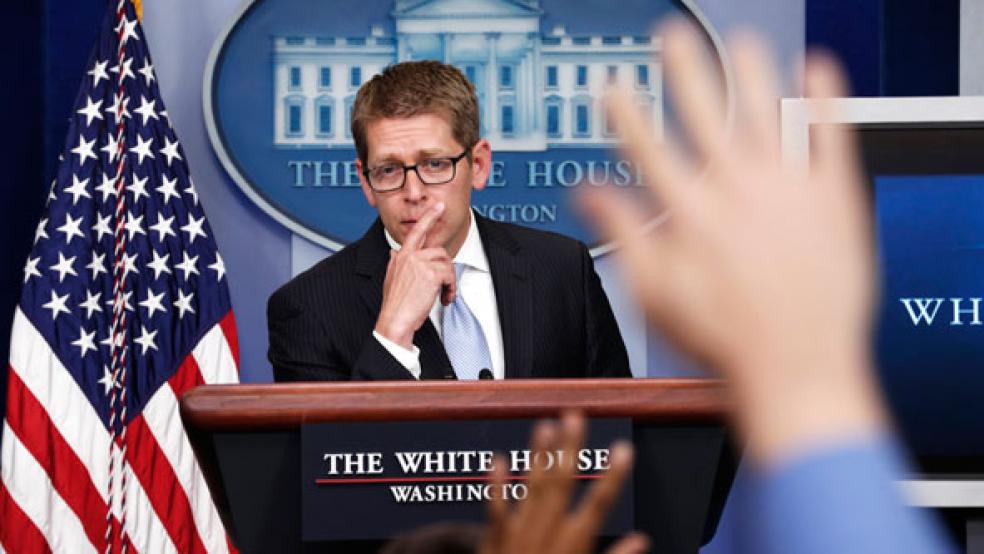Republicans got their smoking gun with a new report about how the IRS hounded Tea Party-themed groups. But as the smoke starts to clear, it looks like GOP congressmen missed their intended target—President Obama.
The White House escaped any blame for the Internal Revenue Service burying conservative “social welfare” groups with “unnecessary” questions and delaying approval of their tax-exempt status, if the agency granted its approval at all, according to the 54-page report released Tuesday afternoon by the Treasury Inspector General for Tax Administration, a presidential appointee by George W. Bush.
All of the IRS officials interviewed for the report “stated that the criteria were not influenced by any individual or organization outside the IRS.” The inspector general’s report blamed the fiasco on “insufficient oversight provided by [IRS] management.”
Obama in a statement called the findings “intolerable and inexcusable.”
The inspector general’s office initiated its audit based on concerns expressed by unnamed congressmen, confirming their suspicions about the IRS but not the administration.
This marks a critical turning point in what increasingly resembled a major political controversy. Only hours before the release of the report, White House press secretary Jay Carney took a stand-offish tone at the daily press briefing.
“We cannot and should not pre-judge the outcome of the investigation,” said Carney, who juggled tough questions about the IRS and, separately, the Justice Department seizing the phone records of Associated Press journalists to identify their sources for an article last year about a thwarted terrorist attack out of Yemen.
The White House claimed to be operating in the dark with the IRS, saying its office of counsel only learned about the claims a few weeks ago. Carney can return to the podium on Wednesday with the bureaucratic equivalent of a pardon.
But this does not close the Republican case on the IRS’ wrong-headed activities. The House Ways and Means Committee will hold a Friday hearing on the matter, and several prominent GOP leaders have latched onto the scandal as a means to attack the IRS’ upcoming administration of Obamacare next year.
House Oversight and Government Reform Chairman Darrell Issa, R-Calif., and Rep. Jim Jordan, R-Oh., sent a letter Tuesday to Lois Lerner, the director of the IRS’ non-profit division, claiming that she misled Congress in her past statements about how Tea Party groups were vetted.
After the report was released, Jordan said in a statement, “We still do not know why the targeting began, how extensive it was, who initiated it and who knew about it. The IRS must be held accountable to the American people, who require a full investigation of the circumstances surrounding the facts established in this audit.”
So, what does the inspector general say?
First of all, it doesn’t state that organizations seeking non-profit status should escape IRS scrutiny. The report merely objects to “inappropriate” politicized criteria. The inspector general also concludes that the IRS has not resolved its problems.
After the 2010 Supreme Court ruling on Citizens United opened the floodgates for independent political expenditures, conservative and liberal politicos started 501 (c)(3) and 501(c)(4) organizations.
These tax-exempt entities are supposed to have an educational and charitable purpose, with any political campaign activities either being forbidden or highly restricted. Many of these groups were integral in the 2010 and 2012 elections, but the majority of them were small time. They reportedly range from Super PACs such as Karl Rove’s Crossroads GPS to the much smaller Glen Beck-inspired branches of the talk show host’s “9/12” project, a reference to the day after the Sept. 11, 2001 terrorist attacks.
Of the 296 applications reviewed by the inspector general, as of the end of last year “108 had been approved, 28 were withdrawn by the applicant, none had been denied, and 160 were open from 206 to 1,138 calendar days (some for more than three years and crossing two election cycles).” None of the groups’ names were listed in the report.
IRS employees based in Cincinnati developed criteria in March, 2010 to “Be On the Look Out” for any organization featuring “Tea Party,” “Patriots,” “9/12,” or other “political-sounding” terms in the name. The inquiries included groups not linked to the Tea Party movement, but IRS officials in Washington allowed a standard that specifically examined conservative groups to stay in place for more than 18 months.
Ninety-eight organizations received requests for additional information from the IRS that the inspector general deemed unnecessary in its report. The requests included donor names, a list of officers and directors’ political affiliations, and information on the outside employment of the organization’s leadership.
The IRS accepted seven of the nine fixes recommended by the inspector general. But the agency disagreed that it needed to “[d]evelop guidance for specialists on how to process requests for tax-exempt status involving potentially significant political campaign intervention. This guidance should also be posted to the Internet to provide transparency to organizations on the application process.”
Instead, the IRS proposed as an alternative that it “develop training.”

